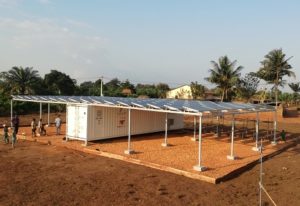Resource centre
REPP backs ground-breaking mini-grid programmes in Sierra Leone and Uganda

More than 55,000 people will be connected to electricity for the first time through a REPP-supported project to develop Sierra Leone and Uganda’s first ever large-scale mini-grid programmes.
Both countries have amongst the lowest electrification rates in the world, with most rural communities dependent on kerosene, candles, fuel wood and charcoal. Thanks to REPP’s USD 2.1m senior term loan – which is being matched by the deal’s lead arranger Dutch development bank, FMO – Winch Energy and NEoT Offgrid Africa are now able to progress their plans to build 25 and 24 solar mini-grids across villages in Uganda and Sierra Leone, respectively.
As well as having a significant role in providing electricity access to clean energy, the mini-grids will mitigate GHG emissions and generate other co-benefits, such as increasing productive use of energy opportunities which works as a driver for long-term economic growth in the project community, increasing the resilience of the community to climate change.
The deal is the latest in a long line of mini-grid projects to attract the support of UK government-funded REPP. The mini-grids to be used in this project have been developed by Winch Energy and are a containerised solution with canopy-mounted solar PV panels with battery storage, delivering reliable AC supply to rural areas.
Geoff Sinclair, Managing Director of REPP’s investment manager, Camco Clean Energy, said: “This loan agreement with Winch Energy and NEoT is another example of how REPP is mobilising capital and transforming the market for distributed renewables in Sub-Saharan Africa.
“As well as enabling the developers to scale up their operations, which in turn will improve the likelihood of securing more funding and building further mini-grids, the transaction can now also serve as a template for the wider rollout of mini-grids in the surrounding markets.”

